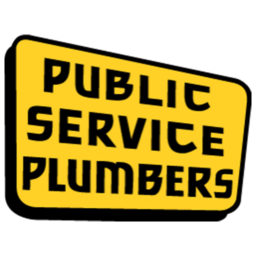A clogged toilet is just as annoying as it is common. We all get them after using too much toilet paper, but sometimes they happen even when we don’t. If you find yourself in the latter category, it might be time to figure out the cause.
Why do clogged toilets happen? What can we do to prevent them? Our plumbing experts at Public Service Plumbers go over these questions in this blog. Keep reading to learn more about how to keep your plumbing system running smoothly:
You Have An Old Toilet
Homeowners at some point will likely hear the term “low-flow toilet”. These toilets were made around 25-30 years ago and were designed to use significantly less water than traditional high-flow toilets. Since then, as technology has improved, so have the newer low-flow models. If your home is on the older side, however, you may still have toilets from the first generation of low-flow models. These models lack the necessary pressure to clear their trap and drain, resulting in frequent clogs.
Unsure how old your toilet might be? Check the back of your toilet for a stamped date – if you have a first-generation model, try cutting back on the toilet paper to see if that lessens the number of clogs. If that doesn’t help, contact a professional plumber to help you with toilet replacement or repair.
Foreign Objects
Did you know that you aren’t supposed to flush tissues down your toilet? Or paper towels? Or even baby wipes? As tempting as it may be to throw these things in your toilet while you’re in a rush, doing so can cause your toilet to clog and your pipes to back up. If your toilet relies on a sewage system, you may even be charged fines from the Environmental Protection Agency (EPA) and Health Department.
Toilets are made to dispose only of items that can quickly dissolve in water, like toilet paper. Here are more everyday items that aren’t meant to be flushed:
- Diapers
- Makeup remover cloths
- Feminine products
- Bandages
- Floss
- Cotton swabs
- Cotton balls
Hard Water Buildup
The water in your home is either hard or soft. Hard water contains a high concentration of dissolved minerals, specifically calcium, magnesium or iron. Soft water is basically the opposite — it’s been treated to remove harsh minerals that can cause damage to your home.
If you’ve noticed that not just your toilet but also your sink and showerheads have low water pressure, then there’s a chance you have hard water build-up. Scale deposits from the minerals build up inside your pipes and can eventually cause them to clog and backup. If you suspect your hard water is causing your clogs, contact a qualified plumber to help you install a water softener system to help prevent clogs from forming.
A Clogged Sewer Line
Usually, one clogged toilet is not a sign of a clogged sewer line. If you have multiple clogged toilets, however, especially all at once, then you may have a problem with your main sewer line. Usually, sewer line clogs are caused by a buildup of waste, but sometimes even tree roots can puncture your sewer line and cause your fixtures to clog. If you suspect this is the case, don’t ignore the problem — a blocked sewer line forces you to stop using all your water facilities. Make sure to contact a qualified plumber to perform an inspection to scope your sewer line.
Contact Public Service Plumbers!
The best way to avoid toilet repairs is by scheduling regular plumbing maintenance for your home. Our Dallas plumbing experts at Public Service Plumbers will make sure your plumbing system is running smoothly year-round. Contact us today for an inspection or for any of your plumbing concerns!






